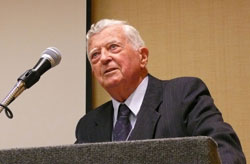O nauce i religii z prof. Owenem Gingerichem
0Goshen College Religion and Science Conference
MARCH 25-27, 2011 AT GOSHEN COLLEGE, Northern Indiana, USA
At the eleventh annual Goshen College Religion and Science Conference the speaker will be Owen Gingerich, Professor Emeritus of Astronomy and of the History of Science at Harvard University and a senior astronomer emeritus at the Smithsonian Astrophysical Observatory.
The lectures on Friday, March 25 at 7:30 p.m. and on Saturday, March 26 at 10:30 a.m. in the Goshen College Church-Chapel free and open to the public.
Source: Goshen College
Nauka i duchowość: jaka jest przyszłość człowieka?
0the RELIGION AND SCIENCE STUDENT SOCIETY of the
ZYGON CENTER FOR RELIGION AND SCIENCE
presents
What Is Our Human Future?
THE 2011 STUDENT SYMPOSIUM ON SCIENCE AND SPIRITUALITY
at the Lutheran School of Theology at Chicago.
on Friday, March 25, 2011
Jak rozumieć stworzenie na obraz Boga w kontekście ewolucji człowieka?
0Public Forum with Joshua Moritz on
Chosen from Among the Animals: The End of Human Uniqueness and the Election of the Image of God
April 14, 2011: 7pm,
Graduate Theological Union Library, Dinner Board Room, 2400 Ridge Road, Berkeley
(free and open to the public)
What does it mean for human beings to be created in the ‘image and likeness of God’? In both popular opinion and the minds of many scientists and academics, the idea of human uniqueness and human superiority has been linked to the Christian doctrine of the imago Dei. Among Christian philosophers and theologians the connection between the unique nature of humans and the divine likeness has similarly been assumed and even systematically argued for. Pursuing what is called the comparative approach to theological anthropology these philosophers and theologians have asked, in what ways is human nature different from the nature of animals and, therefore, like the nature of God? In contrast to these scholars, Moritz questions any concept of the image of God that equates the imago Dei with some characteristic or capacity which presumably makes humans unique—in a non-trivial way—from other animals. He concludes that the image of God is—exegetically and theologically—best understood in light of the Hebrew theological framework of historical election. Viewing the imago Dei as election incorporates the findings of contemporary biblical studies and takes seriously scientific understandings of both evolutionary continuity and the psychosomatic unity of the human person.
Source: CTNS
Natchnienie w nauce i religii
0ADVANCE NOTICE – 2011 CONFERENCE
INSPIRATION IN SCIENCE AND RELIGION
25-27 SEPTEMBER 2011,
at CUMBERLAND LODGE, WINDSOR
Inspiration is twofold: on the one hand it is a sense of purpose which permeates everyday activities. On the other hand it refers to a moment of clarity, a moment in which some internal struggle becomes resolved or some inchoate idea becomes formed. But where does inspiration come from and what is its status in different areas of human endeavour?
Source: Science and Religion Forum
Delusions of constructing cyborgs
0Części zamienne dla człowieka? – Zwodnicze uroki cyborgizacji
Prof. Ryszard Tadeusiewicz
21.03.2011, godz. 18.15
Duża Aula gmachu PAU przy ul. Sławkowskiej 17
W ramach cyklu: Kawiarnia Naukowa Polskiej Akademii Umiejętności i Dziennika Polskiego
Źródło: PAU
ESSAT News (bulletin) December 2010
0European Society for the Study of Science and Theology is a scholarly organisation, based in Europe, which aims to promote the study of the relationships between the natural sciences and theological though.
The content of the issue: see below
Człowiek w obliczu neuronauk
0Colloque du Réseau Blaise Pascal (Sciences, Cultures et Foi)
L’humanité de l’homme bouleversée par les neurosciences
2 et 3avril 2011
à Sainte-Foy-lès-Lyon (Rhône, France)
Il comprendra des interventions de Marc Jeannerod (neurobiologiste, Lyon), Bernard Feltz (philosophe des Sciences, Louvain), Alexandre Ganoczy (théologien, Paris) et Bernard Baertschi (philosophe et éthicien, Genève).
Source: Réseau Blaise Pascal
Umarł ks. prof. Ernan McMullin
0Fr. Ernan McMullin (1924-2011)

Ernan McMullin died on Feb 8th in his home county of Donegal, Ireland. Ernan McMullin was previously the O’Hara Professor of Philosophy Emeritus at the University of Notre Dame, US. An internationally respected philosopher of science, Prof. McMullin was also a specialist on the life and writings of Galileo. He has written and lectured extensively on subjects ranging from the relationship between cosmology and theology, to the role of values in understanding science, to the impact of Darwinism on Western religious thought.
Photo source: Pittsburgh Center for Philosophy of Science
More on Wikipedia
Teologia wobec nowej wiedzy o człowiekuk
0Christians in Science Northern Conference 2011
All God’s Creatures
March 19th 2011
Edinburgh, UK
New discoveries are providing insights into what it means to be human in today’s world and in the context of the story of God’s creation. Alongside this we are also finding the boundaries of our particular uniqueness in this story challenged and perhaps adjusted in the light of our increasing understanding of the universe around us and through our own inventiveness. Our conference will examine many of these discoveries and explore their implications for both Christian theology and also for the Church and wider community. There will be opportunities for dialogue and discussion with the speakers throughout the day.
Program: below
O granicach nauki w Szwajcarii
0Réseau des scientifiques évangéliques Suisse Romande (RSESR)
Les Limites de la science
2 avril 2011
l’Eglise La Fraternelle (Rue Juste Olivier 6, 1260 Nyon)
La notion des limites de la science est au centre de plusieurs débats épistémologiques. La science peut-elle comprendre la vérité, ou seulement en discerner l’ombre? Les questions métaphysiques ont-elles réellement un sens? La science peut-elle légitimement aborder la question de l’existence de Dieu? Est-elle en mesure de répondre à des questions éthiques? Peut-elle justifier sa méthodologie en termes purement scientifiques ou a-t-elle besoin d’être abordée dans un cadre philosophique et théologique?
Source: RSESR
Programme: vide
